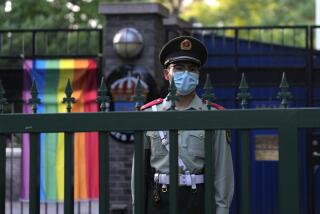China Puts Roadblocks on Information Superhighway
- Share via
BEIJING — In the most sweeping example on record of government censorship of the Internet, China has blocked access to hundreds of politically sensitive web sites, including those of human rights groups, foreign media outlets, Tibetan independence networks and Taiwanese and Hong Kong democratic political organizations.
Although the government declined to comment officially on the blocks it imposed this week, which also affected many web sites containing sexual material, the crackdown appeared to be part of an ongoing campaign orchestrated by the Beijing regime against “spiritual pollution.”
Western diplomats described the action as the latest effort by the Chinese leadership to control the free flow of information.
“It’s another example of China taking a step backward in the Information Age,” said one Beijing-based diplomat.
Three years ago, the government banned private ownership of satellite dishes, killing what then was a booming market. In January, Beijing ordered that foreign-owned economic news services be distributed through the official New China News Agency, which would have ultimate control over their content.
After Internet use began to spread in China last year, primarily among university students, the government signaled that a crackdown on the World Wide Web was in the works. Previously independent Net servers were required last spring to register with the government and sign pledges to limit politically and sexually sensitive materials.
Web experts in the United States say China designed its Internet communications system to pass through a few key “choke points,” making censorship relatively easy. Internet information, unlike a regular phone call, tends to be transferred in packets of information over specialized computers called routers. These routers can be programmed not to accept information from certain Web addresses or to only accept certain pre-approved sites.
Customized programs could also be added to filter out any sites, for example, that use such key words as “sex,” “dissident” or “rights.”
Although a reasonably competent programmer could get around such barriers by connecting directly to an American service provider, for example, such methods are costly and cumbersome and thus are out of reach for most Chinese users.
The U.S. Embassy in Beijing began receiving reports of the crackdown last week. Callers complained that when they attempted access to some sites, they received computer messages of “no response” or “server time out.”
Although other governments--notably those of Germany, Singapore and Vietnam--have tried to restrict Internet access, no other government action has been as sweeping or as politically selective as this one.
For example, access was blocked to several U.S.-based net sites catering to Chinese overseas and domestic university students, including the popular China News Digest and Independent Federation of Chinese Students and Scholars web sites. But access to China Scholars Abroad, a pro-government site sponsored by the State Education Commission, remained open Thursday.
Over the past year, the Chinese student sites, available in Chinese and English, have provided a lively forum for open debate on issues of human rights, democracy and corruption in government.
Nearly all sites with little or no political content, including weather data home pages and science and technology sites, remained available. Likewise, most sites sponsored by foreign governments, including those of the U.S. Information Agency and the American Institute in Taiwan, remained open. But the popular Voice of America site was blocked.
Cut off by the censorship were web sites for several leading U.S. newspapers, including the Los Angeles Times, Wall Street Journal, New York Times and Washington Post. The Cable News Network (CNN) site also was blocked. But the site of the newspaper USA Today remained open.
Internet addresses of most Hong Kong and Taiwan newspapers and magazines, including the Nineties Monthly, Ming Pao and Hong Kong Standard and the generally pro-Beijing Ta Kung Pao in Hong Kong, also were blocked.
Prominent among the sites blocked were those dealing with human rights issues. These included the web sites of Amnesty International, the New York-based Human Rights in China and Human Rights Watch/Asia. Also blocked were most sites related to reports on conditions in Tibet and those sponsored by the overseas Tibet independence movement, including the London-based Tibet Information Network.
Similarly, web sites in Hong Kong--which reverts to mainland control in July 1997--operated by advocates of greater democracy in China were inaccessible; among these blocked sites was the home page maintained by the Hong Kong Alliance in Support of the Patriotic Democratic Movements in China.
Most sites in Taiwan--including that of the island’s largest newspaper, United Daily News, and the home page of National Taiwan University--were also closed off, as was the home page of the Taiwan Government Information Office.
Despite the widespread nature of the ban, several politically sensitive sites remained open, including those maintained by the Times of London, which features reporting that is often highly critical of the Communist government, and the Swedish World Tibet News.
Times staff writer Leslie Helm in Seattle contributed to this report.
More to Read
Sign up for Essential California
The most important California stories and recommendations in your inbox every morning.
You may occasionally receive promotional content from the Los Angeles Times.













